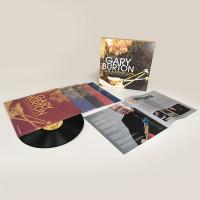"Gary Burton Take Another Look A Career Retrospective" 5 LP Mack Avenue Box Set
Burton's first recording as a group leader was on the 1961 sonic spectacular New Vibe Man in Town (RCA LSP 2420) recorded at Webster Hall in New York City by Ray Hall. It features Brubeck drummer Joe Morello and bassist Gene Cherico. This retrospective begins, appropriately with that album's opening tune "Joy Spring". The Mack Avenue label under the A&R leadership of the recently departed (from the label) Al Pryor, has always cared about sound quality and while this set has been compiled using high resolution digitized masters, the sound quality is as true as possible to the sound of the original recordings.
Here are two excerpts of "Joy Spring", one from the original RCA release and one from the box set:
More about the box set's sound later. As the New Vibe Man In Town liner notes point out, at first, the self-taught Burton knew nothing about jazz, the familiarity with which came later. Thus he brought no pre-conceived musical notions to his playing and on this first album as leader, there were no arrangements—just open space within the song structures. Burton's vibes substitute for the usual piano in the jazz trio.
The box set is organized by label, with the first record containing 8 RCA era selections culled from 7 RCA albums including Duster featuring Larry Coryell, Steve Swallow and Roy Haynes, and the adventurous A Genuine Tong Funeral, written by Carla Bley.
The second record covers Burton's 1970s Atlantic Records era recordings, most of which were produced by Joel Dorn. The shifting group members included Jerry Hahn (guitar), Steve Swallow and Keith Jarrett among others, though the most startling was the solo vibes album Alone at Last.. The Atlantic years ends with two collaborations with violinist Stéphane Grappelli from the sonically and musically spectacular album Paris Encounter (Atlantic SD 1597) recorded in Paris, and "Nuevo Tango", a live Montreux Jazz Festival collaboration with Astor Piazzolla.
Recordings from Burton's ECM era fills disc 3, opening with the classic Chick Corea collaboration "Crystal Silence". These mid-to-late '70s Manfred Eicher productions are Burton's most introspective and collaboratively productive, featuring Pat Metheny, Ralph Towner and percussionist Bob Moses among others. Burton was at ECM for 16 years so a single LP doesn't do the time justice, but the point of the set is not "completism".
From the late 1980s through the early 1990s, Burton was on the GRP label best known for "smooth jazz" and pioneering digital recording. Burton plays xylophone and marimba on two of the selections and as always, he's accompanied by great sidemen including Michael Brecker and John Scofield, but much of the material veers towards "smooth jazz" (not my favorite), though the covers of Red Norvo's "Knockin' On Wood" and Benny Goodman and Lionel Hampton's "Opus Half" achieve considerable traction. Despite mostly great studios, the sound of this early digital era was decidedly DOA (or maybe I'm just prejudiced).
The Concord and Mack Avenue era featured 12 albums and produced some of Burton's best work including two more duet albums with Chick Corea and a return to the quartet format with Corea, Metheny, Dave Holland and Roy Haynes.
Throughout the 75 year old Burton's sprawling career, he's successfully taken note of and made use of cultural fashion, and mixed mallets with jazz, country and rock. In 2017 he decided to call it a career while still at the top of his game. This box set isn't grand enough to encapsulate all of Burton's musical accomplishments but it does a great job of giving listeners both a healthy dose of it and a means by which to explore some of the great original LP stops along the way.
Add nice packaging, an excellently produced, written (by Neil Tesser) and presented full sized booklet, careful and competent mastering and pressing at RTI and you have a worthy send off Gary Burton set.
One last thing about the sound, which is carefully and respectfully done. As good as it is, it makes clear (at least to me) that while digitization of analog recordings has come a very long way from the early stupid days of "it's perfect" when it was anything but, it still has a ways to go!
The vibraphone like the piano is not an easy instrument to record or reproduce. When I compared AAA records to these digitized versions, it was clear that the organic "wholeness" of the originals—the attack, sustain and decay of the instrument—gave way in the digitized versions to a fragmented "pixilated" version where the attack, sustain and decay of each note seemed to be broken into tiny pieces instead of being delivered whole. Listened to casually, it sounds fine but if you really pay attention the "there" of the instrument simply isn't "there"! It's also audible in the digitized versions of some of Reference Recording's great AAA records such as Nojima Plays Liszt originally released on LP in 1986 and reissued recently 1/2 speed mastered at 45rpm from high resolution digital files. When I play both versions "blind" for people either at home or during in-store events everyone notices that the piano on the original is "there" while on the digitally remastered LP it's diffuse and difficult to "see" because the organic "wholeness" of the instrumental attack, sustain and decay gets if not destroyed then somewhat broken apart. It's audible here too. Nonetheless, the mastering is well-done and unless you have originals you'll not know what you're missing.
A superbly produced career retrospective that also serves as a buying guide for the great albums Burton created along the way. Watch the video below!




